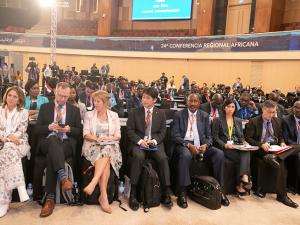
Rise in cross-border crime puts Interpol on high alert
Nearly 300 delegates from across Africa gathered at the on-going 24th Interpol African Regional Conference in Kigali have been urged to strengthen cooperation against crimes.
The message was delivered yesterday at the opening of the three-day meeting, which aims to discuss joint strategies in addressing continental shared security concerns.
The African Interpol Regional Conference takes place every two years in order to assess the state of police cooperation and the fight against transnational crimes.
Discussions at this year’s summit in Kigali have focused on topics that include strategic priorities in the fight against crime in Africa, illicit trafficking of drugs and pharmaceutical products, trafficking in human beings and child exploitation, as well as mechanisms to fight corruption and other financial crimes.
Interpol’s Secretary General, Jürgen Stock, told delegates at the meeting that it should serve as an opportunity to share their experiences and boost their abilities to work together in fighting crimes.
“This meeting is about strengthening cooperation to meet Africa’s security needs,” he said.
He said that as Africa moves towards more integration, Interpol is ready to provide its services to enable security across the continent.
Rwanda’s Prime Minister Edouard Ngirente told delegates at the meeting that Africa, like other continents, is facing a surge in organised crimes and equally called for improved cooperation in fighting them.
“We need much stronger regional and international cooperation,” he said as he officiated at the meeting’s opening.
The premier said that Africa’s growing security threats include terrorism, giving an example of a series of terrorist attacks on innocent civilians in Somalia, Kenya, Mali and Nigeria.
Other security threats include those related to illicit trafficking of drugs and pharmaceuticals, financial crimes and corruption, trafficking in human beings and cybercrimes.
“These threats undermine the development of Africa but also constitute a violation of human rights. Human trafficking deprives thousands of people in Africa and elsewhere in the world of their fundamental freedoms,” he said.
Ngirente also said that illicit financial flows out of Africa pose a significant threat to the developmental agenda of the continent, reminding delegates that the United Nations Economic Commission for Africa (UNECA) estimates that illicit flows from Africa could be as much as $50 billion a year.
Rwanda’s Inspector General of Police, Dan Munyuza, said that emerging crimes in Africa are being facilitated by technologies such as internet and explained that sharing of experiences and knowledge remains critical for efforts to fight the crimes.
“We are more than willing to work together as members of Interpol,” he said about Rwanda hosting the Interpol conference in Kigali and the country’s continued contribution for cooperation in security maintenance in Africa.
In a media conference held after the meeting opened yesterday, Munyuza said that the summit would help delegates share information that can be useful in fighting different kinds of terrorism.
On the sidelines of the conference, Rwanda Investigation Bureau (RIB), Interpol, Eastern Africa Police Chiefs Cooperation Organisation (EAPCCO) Secretariat, and regional partners such as the United Nations Office on Drugs and Crime (UNODC), and the EU funded projects on regional law enforcement for Greater Horn of Africa are holding a series of trainings.
They include one code-named Table Top Exercise (TTX), which will equip participants with relevant skills in countering cyber enabled crimes, and another named Cyber Tracks II, which looks at a multidisciplinary approach to prevent, detect, and investigate terrorism.
